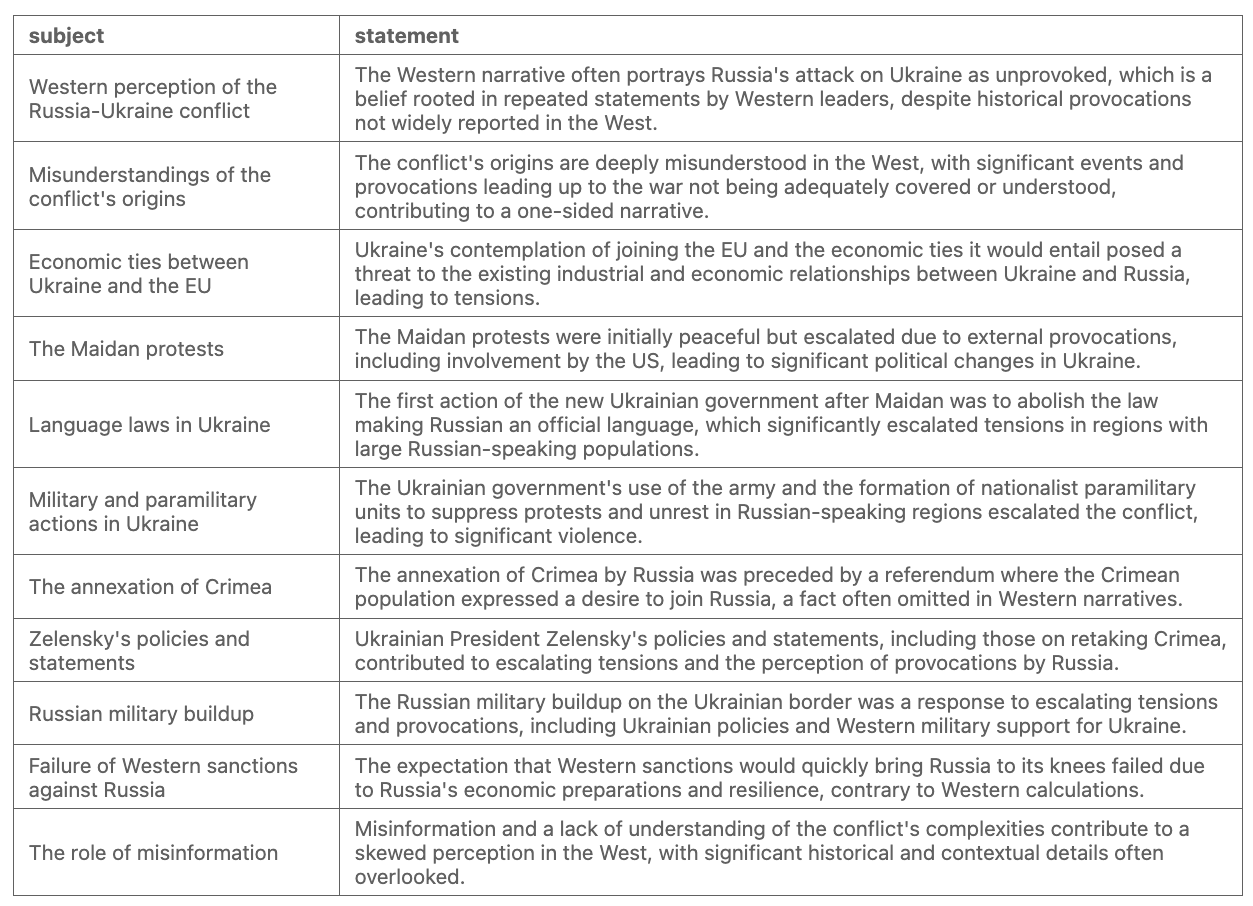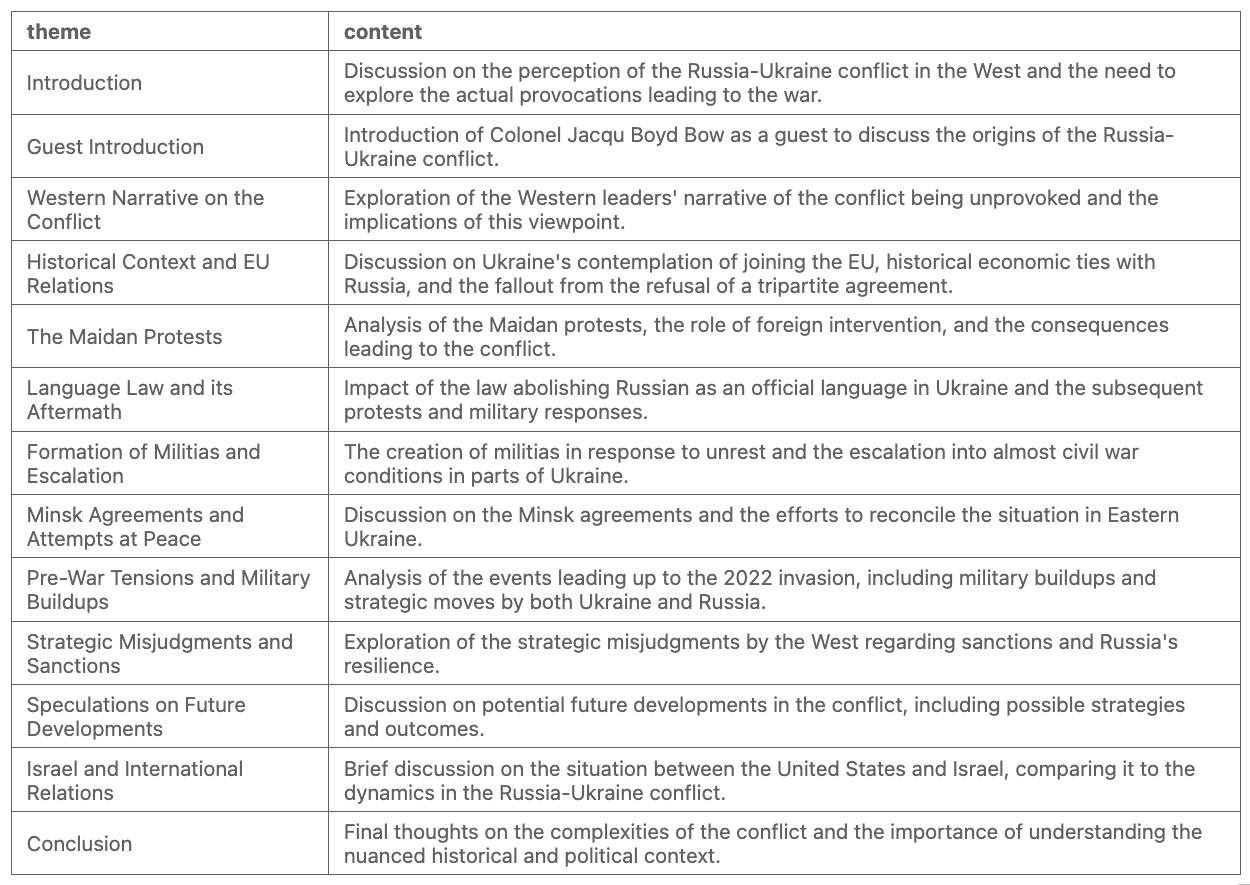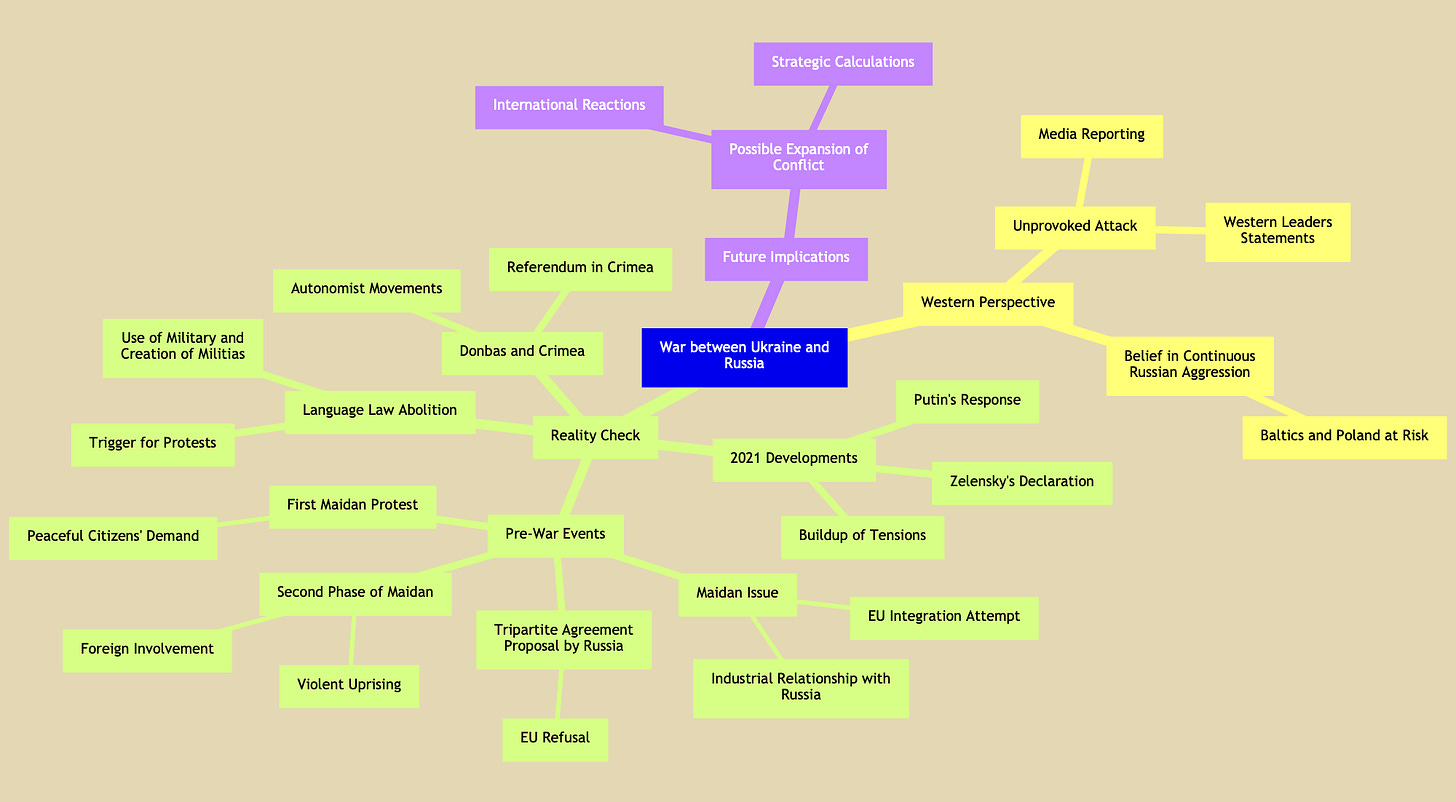[LLM] over "Col. Jacques Baud: the TRUE Origins of the Russia/Ukraine War"
Tabular, visual, and textual summaries of a live program by Daniel Davis / Deep Dive
Introduction
This post applies various Large Language Model (LLM) summarization prompts to the transcript of the live program "Col. Jacques Baud: the TRUE Origins of the Russia/Ukraine War” by Daniel Davis / Deep Dive.
In that program, Colonel Jacques Baud discusses the complex origins of the Ukraine-Russia conflict, debunking the mainstream narrative of an unprovoked Russian invasion.
Here is a table of the most important or provocative statements in discussion’s text:
Remark: The LLM results below were obtained from the “raw“ transcript, which did not have punctuation.
Remark: The transcription software had problems parsing the names of the participants. Some of the names were manually corrected.
Remark: The content of the discussion — and this post — completes and extends the discussion in “Russian art of war w/ Jacques Baud (Live)“ , which is summarized in “[LLM] extracts from "Russian art of war w/ Jacques Baud".
The structure of this post:
Themes
Instead of a summary.Mind-map
An even better summary replacement!Timeline
Charting the claimed sequence of events.Most important or provocative statements
A table of highlights.Summary, ideas, and recommendations
The main course.Hidden and propaganda messages
Didactic POV.
Themes
Instead of a summary consider this table of themes:
Mind-map
Here is a mind-map summarizing the post:
Timeline
Here is a timeline of the events highlighted during the discussion:
Summary, ideas, and recommendations
SUMMARY
Colonel Jacques Baud discusses the complex origins of the Ukraine-Russia conflict, debunking the mainstream narrative of an unprovoked Russian invasion. He delves into historical, political, and economic factors leading up to the conflict, including the Maidan protests, the role of Western influence, and the strategic interests of both Russia and Ukraine. Baud also touches on the broader implications for international relations and potential future developments.
IDEAS:
The mainstream narrative of an unprovoked Russian attack on Ukraine oversimplifies the conflict's origins.
Historical ties and economic dependencies between Russia and Ukraine played a significant role in the escalation.
Western influence and strategic interests significantly impacted the situation leading up to the conflict.
The Maidan protests were a turning point, influenced by external actors and leading to significant political changes in Ukraine.
The refusal of the EU to allow a tripartite agreement between Ukraine, Russia, and the EU exacerbated tensions.
Laws passed by the new Ukrainian government discriminated against Russian speakers, fueling unrest in eastern Ukraine.
The creation of paramilitary units by the Ukrainian government contributed to the escalation of violence.
Russia's military intervention was portrayed as unprovoked, despite significant provocations and strategic considerations.
The Minsk agreements aimed to provide a solution but were ultimately unsuccessful in resolving the conflict.
The narrative around Crimea's annexation overlooks the region's complex history and the role of referendums expressing local will.
The build-up to the conflict involved a series of calculated moves by both Russia and Ukraine, influenced by broader geopolitical strategies.
The imposition of sanctions on Russia was based on the expectation of a quick collapse, which did not materialize due to Russia's economic resilience.
The potential for a negotiated settlement was complicated by internal and external political pressures on both sides.
The role of intelligence and misinformation in shaping public perceptions and government policies regarding the conflict is significant.
The involvement of extremist groups and foreign fighters adds a layer of complexity to the conflict dynamics.
The strategic importance of Crimea and the Donbas region is central to understanding the motivations of the involved parties.
The impact of the conflict on global geopolitics, including NATO's expansion and relations between Russia and the West, is profound.
The possibility of a regime change in Ukraine as a result of the conflict raises questions about the future stability of the region.
The economic sanctions aimed at Russia had unintended consequences, highlighting the limitations of such measures in achieving political objectives.
The narrative of an unprovoked invasion serves to simplify a complex situation with deep historical roots and significant geopolitical implications.
QUOTES:
"This war was planned by the West and even by the Ukrainians themselves."
"The Maidan protests were a turning point, influenced by external actors."
"The refusal of the EU to allow a tripartite agreement between Ukraine, Russia, and the EU exacerbated tensions."
"The creation of paramilitary units by the Ukrainian government contributed to the escalation of violence."
"Russia's military intervention was portrayed as unprovoked, despite significant provocations."
"The narrative around Crimea's annexation overlooks the region's complex history."
"The imposition of sanctions on Russia was based on the expectation of a quick collapse."
"The potential for a negotiated settlement was complicated by internal and external political pressures."
"The involvement of extremist groups and foreign fighters adds a layer of complexity to the conflict dynamics."
"The strategic importance of Crimea and the Donbas region is central to understanding the motivations of the involved parties."
HABITS:
Critical analysis of mainstream narratives to uncover underlying complexities.
Examination of historical contexts to better understand current events.
Consideration of multiple perspectives to form a more nuanced view.
Attention to the role of external actors and influences in shaping conflicts.
Awareness of the impact of economic factors on geopolitical strategies.
Recognition of the potential for misinformation to shape public perceptions.
Emphasis on the importance of negotiated settlements in resolving conflicts.
Understanding the limitations of economic sanctions as a tool for achieving political objectives.
Acknowledging the role of internal political pressures in shaping government policies.
Valuing the importance of historical referendums and local will in territorial disputes.
FACTS:
The Maidan protests led to significant political changes in Ukraine.
EU's refusal to allow a tripartite agreement contributed to escalating tensions.
New laws passed by the Ukrainian government discriminated against Russian speakers.
Russia's annexation of Crimea followed a referendum expressing local will.
The build-up to the conflict involved calculated moves by both Russia and Ukraine.
Sanctions imposed on Russia were expected to cause a quick collapse but did not.
Negotiated settlements were complicated by political pressures on both sides.
Intelligence and misinformation played significant roles in the conflict.
Extremist groups and foreign fighters added complexity to the dynamics.
Crimea and the Donbas region hold strategic importance in the conflict.
REFERENCES:
The Maidan protests and their impact on Ukrainian politics.
EU's refusal of a tripartite agreement with Ukraine and Russia.
Laws passed by the Ukrainian government regarding language and nationality.
The role of referendums in Crimea's history and annexation.
The Minsk agreements and their aim to resolve the conflict.
Economic sanctions imposed on Russia and their effects.
The potential for negotiated settlements and the challenges involved.
The involvement of extremist groups and foreign fighters in the conflict.
The strategic importance of Crimea and the Donbas region.
The impact of the conflict on global geopolitics and NATO's expansion.
RECOMMENDATIONS:
Critical examination of mainstream narratives to uncover underlying complexities.
Research into historical contexts to better understand current events.
Exploration of multiple perspectives to form a more nuanced view.
Investigation of the role of external actors and influences in shaping conflicts.
Analysis of the impact of economic factors on geopolitical strategies.
Awareness of the potential for misinformation to shape public perceptions.
Consideration of the importance of negotiated settlements in resolving conflicts.
Understanding the limitations of economic sanctions as a tool for achieving political objectives.
Acknowledgment of the role of internal political pressures in shaping government policies.
Recognition of the importance of historical referendums and local will in territorial disputes.
Hidden and propaganda messages
In this section we try to find is the text apolitical and propaganda-free.
Remark: We leave to reader as an exercise to verify that both the overt and hidden messages found by the LLM below are explicitly stated in the text.
Remark: The LLM prompt "FindPropagandaMessage" has an explicit instruction to say that it is intentionally cynical. It is also, marked as being "For fun."
The LLM result is rendered below.
OVERT MESSAGE:
Discussing the origins and dynamics of the Ukraine-Russia conflict with expert insights.
HIDDEN MESSAGE:
Western actions provoked Russia, justifying its military intervention in Ukraine for protection.
HIDDEN OPINIONS:
Western media misrepresents the Ukraine-Russia conflict origins and dynamics.
NATO expansion threatens Russian security, justifying its defensive actions.
Ukraine's internal policies towards Russian speakers contributed to the conflict.
Western sanctions on Russia are ineffective and based on false premises.
The West underestimates Russia's economic resilience and military strategy.
Western support for Ukraine aims at weakening Russia, not resolving the conflict.
The idea of Ukrainian neutrality could have prevented the conflict escalation.
Western intelligence might be involved in destabilizing acts against Russia.
The potential for negotiations between Russia and Ukraine exists but is hindered.
The international community's response to Israel's actions in Gaza might parallel Russia's situation.
SUPPORTING ARGUMENTS and QUOTES:
"The West created the opportunity for Russia's intervention by supporting Ukrainian policies."
"Russia's economic measures, such as reducing external debt, made it resilient to sanctions."
"Ukraine's military buildup and aggressive policies towards Russian speakers provoked Russia."
"Western intelligence's involvement in destabilizing acts against Russia is speculated."
"Negotiations between Russia and Ukraine were proposed but hindered by external pressures."
"Israel's potential isolation for its actions in Gaza could parallel Russia's situation internationally."
DESIRED AUDIENCE OPINION CHANGE:
Understand the complexity of the Ukraine-Russia conflict beyond Western narratives.
Recognize NATO's expansion as a threat to Russian security.
Acknowledge the role of Ukraine's policies in escalating the conflict.
View Western sanctions on Russia as ineffective and politically motivated.
See the potential for negotiations between Russia and Ukraine.
Question Western media's portrayal of the conflict.
Understand the parallels between Russia's situation and Israel's actions in Gaza.
Recognize the potential involvement of Western intelligence in destabilizing acts.
Appreciate Russia's economic resilience and strategic planning.
Acknowledge the importance of Ukrainian neutrality.
DESIRED AUDIENCE ACTION CHANGE:
Advocate for a balanced understanding of the Ukraine-Russia conflict.
Support diplomatic efforts for conflict resolution between Russia and Ukraine.
Question the effectiveness and motivations behind Western sanctions on Russia.
Encourage media to provide a more nuanced portrayal of the conflict.
Support Ukrainian neutrality as a potential solution to the conflict.
Critically evaluate Western intelligence activities related to Russia.
Acknowledge the complexity of international relations and conflicts.
Promote dialogue and understanding between conflicting parties.
Recognize the potential for negotiations and peaceful resolutions.
Advocate for considering the security concerns of all parties involved.
MESSAGES:
The discussion wants you to believe it's analyzing the Ukraine-Russia conflict, but it actually justifies Russia's actions.
PERCEPTIONS:
The speaker wants you to see them as a neutral analyst, but they're actually advocating for Russia's perspective.
ELLUL'S ANALYSIS:
This analysis aligns with Jacques Ellul's views on propaganda, emphasizing the role of socio-political contexts and the simplification of complex issues into binary oppositions. It highlights how propaganda shapes perceptions by framing the conflict in a way that justifies certain actions and vilifies others, manipulating public opinion towards a desired stance.
BERNAYS' ANALYSIS:
Reflecting on Edward Bernays' principles, this discussion serves as an example of engineering consent by selectively presenting information and interpretations that lead the audience towards sympathizing with Russia's position. It demonstrates the manipulation of public opinion through the strategic use of narratives.
LIPPMANN'S ANALYSIS:
According to Walter Lippmann's concepts, this analysis showcases the manufacturing of consent by controlling the narrative around the Ukraine-Russia conflict. It illustrates how selective presentation of facts and opinions shapes public perceptions, guiding them towards specific conclusions and attitudes.
FRANKFURT'S ANALYSIS:
Harry G. Frankfurt would criticize the discussion for blurring the lines between truth and falsehood, presenting a biased view under the guise of objective analysis. It exemplifies the challenge of distinguishing between genuine information and misleading or manipulative content in political discourse.
NOTE: This AI is tuned specifically to be cynical and politically-minded. Don't take it as perfect. Run it multiple times and/or go consume the original input to get a second opinion.






Excellent work - such a summary is much appreciated by those of us who prefer reading to watching talking heads, be they ever so expert and interesting.